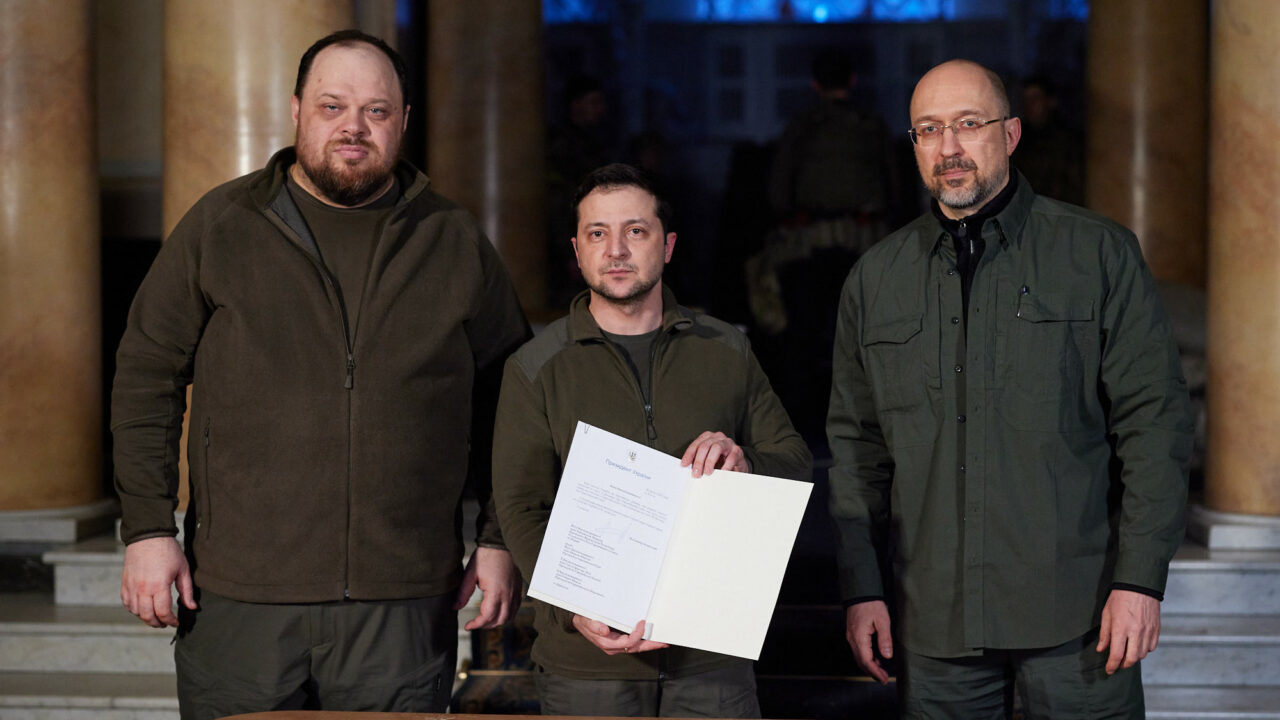A new Versailles declaration for Ukraine
When EU member states meet in Versailles on 10 March, they should offer Ukraine a strong welcome through a political declaration that recognises its European future
This week, 103 years after the signing of the peace treaty to end the first world war, Europe has the chance to make Versailles the scene of another historic declaration. But, this time, the war is still going on. Europeans will need to stick together if they are to prevent a return to a world in which countries use military force to redraw borders. When the European Union’s 27 heads of state and government gather in the palace on 10-11 March, they should offer Ukraine a new Versailles declaration to welcome the country’s ambition eventually to join the EU – one similar to the 2003 political declaration in Thessaloniki that recognised the European future of the Western Balkans.
Five days after Russian President Vladimir Putin started the full-scale invasion of Ukraine, President Volodymyr Zelensky submitted his country’s application to join the EU. Member states were initially divided in their reaction: the eight central European countries welcomed it, but the rest stayed silent. Their lack of enthusiasm stems from the complications of enlarging the union – and, frankly, their great disappointment in the degradation of the rule of law and democracy by the ruling parties of two of the countries that joined in 2004, Hungary and Poland. The Kremlin has benefited from this corrosion of the EU’s integrity and values from the inside, particularly when Hungarian Prime Minister Viktor Orban has blocked many common EU positions and initiatives that disadvantaged Russia over the years. Until the EU works out how to prevent ruling parties from taking over state institutions and promoting foreign interests at home, it will be reluctant to take in new members.
There are also practical reasons not to start the long and arduous path to EU membership. So long as Ukrainian cities are under bombardment, the Rada will be unable to debate how to implement 100,000 pages of EU rules and regulations. To engage in accession negotiations, every Ukrainian ministry would have to set up a large team of civil servants to work through all the legal and technical requirements. Ukraine would need to make major reforms to its state administration and economy to root out corruption and meet the standards of the single market. This work could only start under conditions of peace and reconstruction. Right now, the country needs to devote its resources to defending itself.
Brussels should immediately start integrating Ukraine into parts of the union that would provide it with practical assistance
On the EU side, to offer candidate status immediately to Ukraine would be to undermine the demanding conditions for membership. Because of the deep economic and institutional integration this requires, countries take years to work their way through the stages of the accession process so that they can implement and enforce EU law on entry. The EU should not allow new applicants to leapfrog the stages that Western Balkans countries have been toiling through for many years.
Instead, the EU should offer Ukraine a strong and sustained welcome through a political declaration that recognises its future is in the EU once it meets the conditions of accession. This new Versailles declaration would give Ukrainians clear confirmation that they would not be cut off from the EU even if Russian forces occupy more of their territory.
The declaration would not commit the EU to accelerate the accession process before Ukraine was politically and institutionally ready. But it would keep open the promise of eventual membership. In practical terms, such a declaration is not much more than what is already guaranteed in Article 49 of the Lisbon Treaty. But the declaration would be an important political signal to respond positively to Ukraine’s request for EU membership – and would open the door for Georgia’s and Moldova’s European perspectives.
In the meantime, Brussels should immediately start integrating Ukraine into parts of the union that would provide it with practical assistance and reduce its energy dependence on Russia. There are many ways for the EU to enhance its current relationship with Ukraine, such as by strengthening their economic ties to create a transitional step towards eventual membership. For example, the heart-warming support that citizens across the EU have shown for refugees fleeing Ukraine needs to be backed at the official level by long-term visas and work permits. The EU can also integrate Ukraine into the European Green Deal, unlocking funds to bring the country along with the union’s green transition and end its dependence on Russian energy.
Georgia and Moldova also deserve a clear European perspective, having made applications for membership on 3 March 2022. One should not forget that both countries have been targets of the Kremlin’s military aggression: Russia invaded Georgia in 2008 and has long stationed troops in the breakaway region of Transnistria. The European Commission has started a formal assessment of all three new applications, but that could take a long time. They need political reassurances now.
The EU’s heads of state and government should demonstrate that Russia’s aggression will not drive the union to abandon its neighbours. By doing so at historic Versailles, the union would show that it is applying the lesson that integration is the route to long-lasting peace for all of Europe.
Heather Grabbe is the director of the Open Society European Policy Institute.
Iskra Kirova is a senior policy analyst at the Open Society European Policy Institute.
The European Council on Foreign Relations does not take collective positions. ECFR publications only represent the views of their individual authors.



